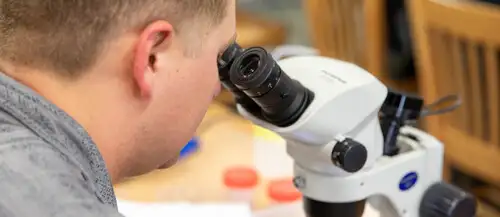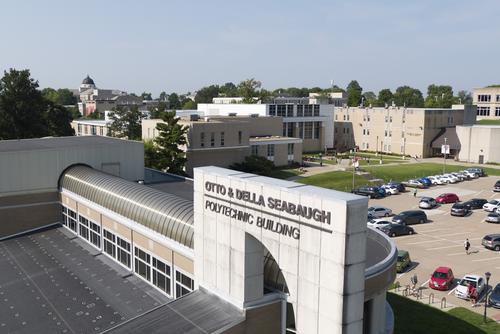Biology (MS)
Continue to main content
Biology (MS) Degree Map
Explore the courses you'll need to complete your degree.
Outcomes & Careers
-
$100k
Biological Scientist
According to the Bureau of Labor Statistics, the mean annual salary for a biological scientist is $100,440.
-
$101k
Biology Professor
According to the Bureau of Labor Statistics, the mean annual salary for a biological science teacher, postsecondary is $101,340.
-
$73k
High School Biology Teacher
According to the Bureau of Labor Statistics, the mean annual salary for a secondary school teacher is $73,700.
There are two degree tracks for graduate studies in the biological sciences. Students can either choose the Plan A option (thesis option) or Plan B option (non-thesis option). The Plan A option culminates with the defense of the findings of an independent research project and a thesis describing the pertinent literature, methodology, and results of the research project. Students often publish aspects of their theses in peer-reviewed journals and present their findings at national and international conferences. The Plan B option culminates with a written critical evaluation on a specific area of study in biology and a written examination.
Required Courses:
- BY688 Experimental Design in Biology (3)
- Biology electives – choose 18 hours from BY515-600 level courses
- Electives – choose 6 hours of graduate-level courses (500-600 level)
Choose One of the Following Areas
THESIS AREA:
- BY699 Thesis (3)
- GR699 Master’s Oral Examination (0)
NON-THESIS AREA:
- GR699 Master’s Oral Examination (0)
Choose 3 hours:
- BY583 Internship (1-3)
- BY591 Research in Biology (1-3)
- BY695 Literature Review in Biology (3
The curriculum of every graduate student in biology varies with their interests in biology, i.e., graduate students in biology often pinpoint a specific area of biological investigation and focus the majority of their attention toward developing their skills in that area of emphasis. Thus, no two curricula of graduate students will be the same. A graduate student in biology creates their degree plan (including course curriculum) with their advisor during their first semester in graduate school. This includes at least 30 total credit hours that are partially accomplished through credit hours of biology courses (BI, BO, BT, and/or ZO) However, there are courses that every graduate student in biology will have to complete for graduation.
In addition to the criteria established for general admission to graduate studies, applicants must have the following:
- An undergraduate GPA of 2.75 on a 4.0 scale
- Minimum 2.75 GPA on a 4.0 scale for the last 30 semester hours of undergraduate science and math courses
- Faculty Sponsor Agreement
- Two letters of recommendation addressing the applicant’s potential for academic success. Letters are waived if a completed Faculty Sponsor Agreement for Curriculum A/Thesis is submitted.
What will it cost?
Graduate Assistantships
The graduate assistantship (GA) is designed to provide support during full-time graduate study. It’s an opportunity for the graduate students to serve in a professional role while establishing a professional relationship with faculty and administrators. In addition to a per year stipend, GAs gain valuable experience. There are two kinds of assistantships: teaching and administrative.
Become a Redhawk.
Do more than dream about the future. Take the first steps to make it all happen.
College of Science, Technology, Engineering, and Mathematics
This program is housed within the College of STEM. The College prepares students to find creative solutions to problems. Curiosity and analysis merge, creating students ready to figure things out and then use that knowledge to make things better.
Graduate Coordinators
Graduate coordinators serve as the contact for graduate programs. The coordinators are most often faculty within the college that houses the program, helping you to get questions answered and first-hand knowledge of the degree requirements and placement opportunities.
Getting the Job
Your education is just one piece to launching an extraordinary career. Once you’ve mastered the material, you still have to find the job you want, make the right connections, and sell your knowledge and experience—if all this is giving you anxiety, don’t panic. SEMO’s Career Services office is here to help you with the next step. Our boldly supportive faculty will provide the expertise and support you need, so you’re landing your dream job in no time.
Cape Girardeau, Missouri 63701

